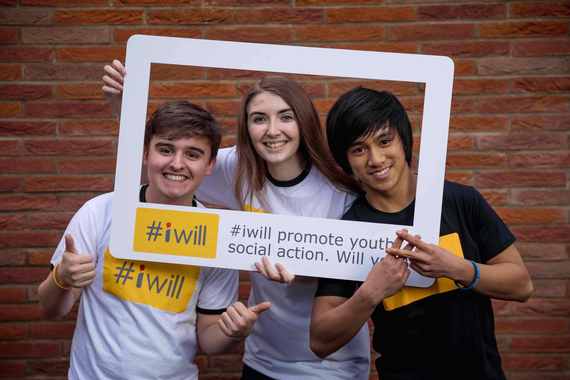As 2017 grows old, November is nevertheless a month for the young. It began with National Youth Work Week, will encompass the UN’s Universal Children’s Day (20 November) and will end with #iwill’s five-day campaign to promote social action among 10-20-year-olds (20-24 November).
During last year’s #iwill week, we pledged to ensure that young voices were woven into the fabric of our decision-making through the Spirit of 2012 Youth Advisory Panel (YAP), made up of 10 young people from across the UK. This year, we want those young people to do our talking for us, which is why we’re featuring a different ‘YAP-er’ every day of the #iwill week on our website and social media.
Every other year, the YAP are given responsibility for allocating £100,000 through their Challenge Fund to projects they feel will empower young people and enrich their lives and their communities. They manage the entire process – from setting out the initial application criteria to making the final decisions on allocating funds. Projects they have chosen to support include Reading Rooms, a literacy group for young offenders in Northern Ireland, and Rhythm and Respect, a community music project based in Plymouth. These have already been hugely successful, both in terms of levels of engagement and the legacy they are leaving behind.
We know this because we have just published our first independent evaluation report into the impact of our work. One of the participants of Rhythm and Respect told our evaluator: ‘I love drumming with Rob, it gives me inspiration, makes me laugh and uplifts my spirit.’ Overall, we discovered a 10% increase in life satisfaction, and a 5% decrease in levels of anxiety, was reported by participants and volunteers across all Spirit-funded projects.
It is gratifying that our funding is of benefit to those in need – young men like Dean Boyd in Belfast who was helped by Reading Rooms to begin the education he had missed out on. But it is also of huge benefit to the 25,000 volunteers we have funded so far, many of them also young people. As fresh data and new analyses emerge every week that highlight the scale of the wellbeing crisis among young people, we know that youth social action is part of the solution to this growing problem.
When our evaluators fed back on the Inclusive Futures project we funded, whose aim was to change attitudes to disability by creating volunteering opportunities for both disabled and non-disabled young people, they found that the proportion of young volunteers reporting a sense of empowerment went up from just over three-quarters to 98% after one of our national camps.
They made explicit the link between volunteering and enhanced wellbeing for young people. And volunteering for social action doesn’t just benefit the individual – it also benefits the wider community. One of our disabled Inclusive volunteers was described as an inspiration for other children – those with disabilities, and without: ‘they will have looked at her and said “maybe I can achieve now”,’ said a staff member to our evaluation team.
Getting involved in social action – which could mean anything from walking a dog to helping cook meals to being a volunteer reader – puts young people at the centre of building better communities. And it also helps them develop their own abilities, learning transferable skills that make them more likely to progress in education, training or employment. Everyone benefits.
All of this makes #iwill’s work so vital – and it’s why we’re proud to support it. The young people we work with are incredibly engaged with what is going on in the world around them, and are passionate for change that will make things better.
On 1 December our Youth Advisory Panel will take their next step towards making this change, launching this year’s Challenge Fund by inviting new applications from projects with a focus on empowering young people. We can’t wait to see the results of their selection process – and to see the knock-on benefit in happier, healthier young people.
